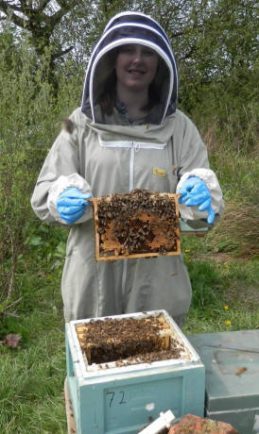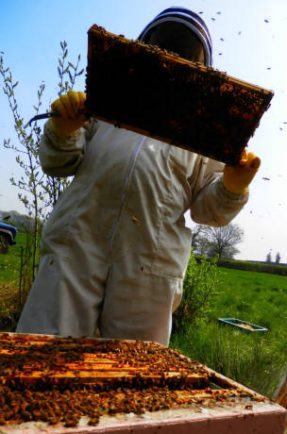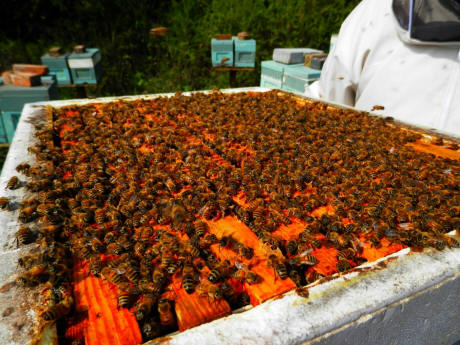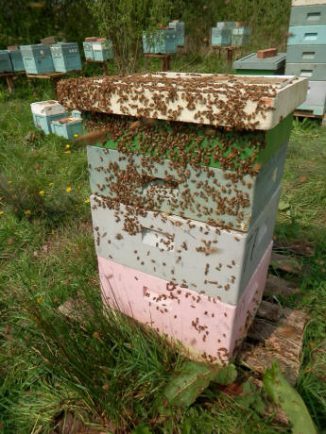HONEY-loving residents curious to discover the world of bee keeping have been invited to spend a morning tending to hives and learning what it is all about.
In partnership with Webbs Garden Centre, in Wychbold, professional Bromsgrove bee keeper Chris Broad, who runs Saltway Honey with his wife Susan, has organised a series of three hour taster courses.
Equipped with wellies and rubber gloves, Standard reporter Beth Sharp went along to meet Chris to see what his students would be learning.
————————————————————————————–
Before putting on the bee suit I went over my initial concern – being stung – a lot. Chris, who has been keeping bees since 1999, said sometimes he would be stung once and others it would be half a dozen times.
“After you have been stung 20 to 30 times you build up an immunity to it.” he added.
Chris has 100 hives for breeding new queen bees and 330 hives for making honey – eight of them at Webbs’.
Last year Chris managed to produce around ten tons of honey. The national annual average of honey one hive can produce is around 30lbs, but Chris’ bees produced three times this amount.
Chris and his daughter, 11-year-old Ketziah, who often helps her dad, took me out to a site near their home to show me what the buzz was about.
When we arrived it was quiet as the bees had not properly woken up. To my surprise there was a number of polystyrene hives.
“These particular types of hives suit me best because they help keep the bees warm in winter and cool in the summer.” Chris told me.
To set up one hive costs £500 with Chris recommending all new keepers start with standard hives first to see how they got on.
When I tried to pick up one segment of a hive it was much heavier than I expected, because of the amount of honey in it.
From watching Chris, I got the impression strength, good eyesight, steady hands and nerves of steel are much-needed attributes for bee-keepers.
To check the colonies, Chris puffed smoke through the hive entrance. Bees are woodland insects and evolution has taught them to fear fire more than anything else. So when smoke enters the hive it diverts their attention whilst the bee-keeper takes their home apart.
Chris said each hive needed 30 minutes’ work each week.
“When we started I found it really hard not to flinch when the bees were flying around my head and landing on me – my initial instinct was to run away like a bumbling buffoon. By lunchtime I overcame this fear and was so accustomed to the buzz I even found it relaxing.
“Once we moved on to the larger hives I was very grateful for my suit – there were thousands of bees flying around and I felt like I was inside a big swarm.
Chris said: “Normally people become interested in bee-keeping in the summer-time but most courses are run through the winter and they can be quite involved which is why the taster courses are great.
“They give people two hours with the bees and a rough idea of costs and the time commitment needed to keep them – they either get hooked or satisfy their curiosity and realise ‘this is not for me’.”
Each hive was made up of a number of wooden frames covered with honeycomb. It was fascinating to see how each cell had a different function and was either used to store small pots of honey, pollen or eggs.
Chris said you could tell if the hive and the queen were healthy by looking at the four different life stages – eggs, larvae, cocoons and fully-grown bees.
In a hive there are three types of bees, the one queen who is the only one with fully developed ovaries. She will mate once with a number of drones, male bees, from another colony and will then remain fertile for life – she can lay up to 2,000 eggs a day.
When she dies or becomes unproductive the other bees select a young larva and feed it royal jelly, this helps them become a fully matured queen, her cell will be much bigger than the ones used to grow other bees.
Chris selectively breeds docile bees, he said the queen’s personality and behaviour reflected on the whole colony so he only allowed hard-working queens which were less likely to sting him to breed.
Drones cannot sting and are kept on standby during the summer to mate with virgin queens. They are expelled from the hive in the autumn as there is not use for them in the winter.
All worker bees are female and live for about four to nine months during the winter and for around six weeks during the summer – they literally work themselves to death collecting pollen to turn into food.
If the queen fails so does the whole colony. We found one hive where the queen had only been making drones so they were not producing food. We had to split the hive up and put them with another hive with a different queen.
In the summer, colonies grow quickly so it is important to check the bees have enough room to ensure they do not swarm – this is when the queen flies off to build a new nest with half the hive’s residents.
You can tell when the are preparing to leave because they start growing queens cells, We found many of these. To stop them swarming the hive can be split manually or the cells removed.
Chris said late May early June was the best time to start bee-keeping as any later than that will mean the bees may not produce honey in their first year. Starting earlier leads to colonies becoming too big.
Worcestershire has a strong bee-keeping community which has led to the number of honey bees in the county going up in recent years. The best place to keep bees is in remote areas and the county has plenty of those.
Those wanting to keep bees in their gardens need to be careful and should choose areas with tall natural barriers like trees and hedges which can create a high flight paths to divert them away from neighbours.
Anyone who enrols on the two-hour courses at Webbs will be provided with a bee-keeper suit and there will be a further hour-long indoor session to answer questions regarding equipment, local training courses and recommended reading.
—————————————————————————–
The taster sessions, which are £25 per person, will be run on May 12, June 22, July 20, August 31 and September 21 from 10.30am till 1.30pm.
The pilot courses run last year proved popular and it is expected that this year’s will be the same.
Visit www.webbs.co.uk for more – advanced booking is essential.
Bee brave! – The trays are removed from the hives.
Hive of activity! – One of the containers. Pictures by Beth Sharp.
A real buzz about the place – The bees on one of the hives.

















